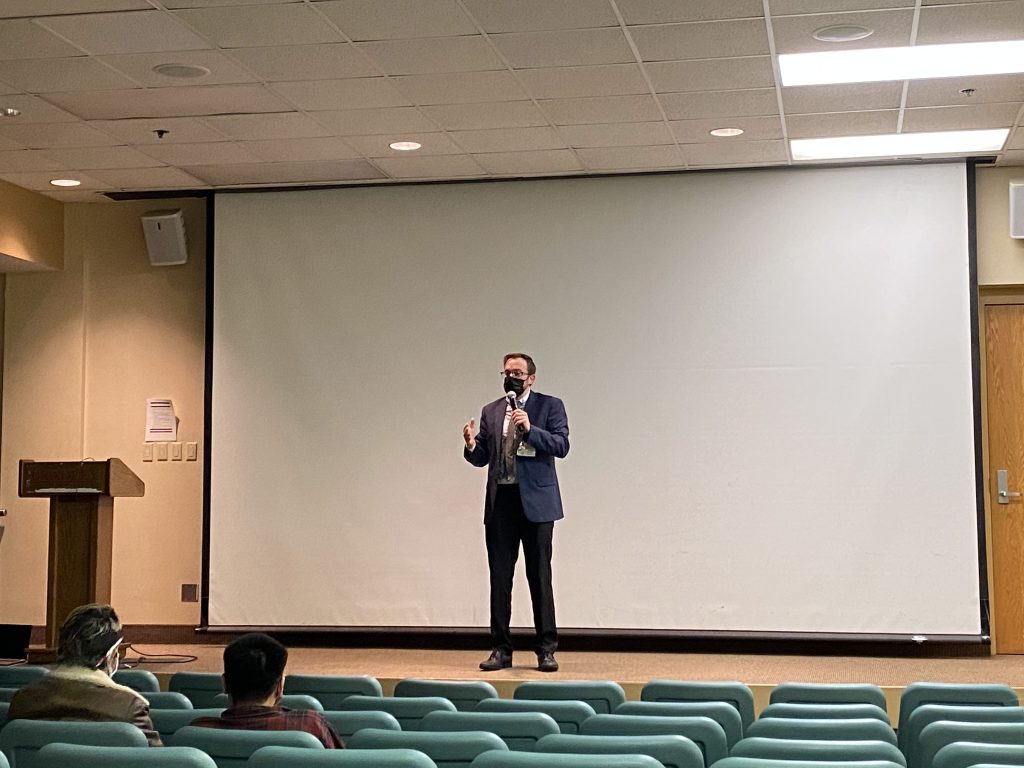
Content warning: There will be discussions of sexual conduct and sexually transmitted diseases in this article.
Sex health and safety can be an awkward subject to discuss. To raise more awareness about the topic, the Sigma Lambda Gamma sorority held a sexual health panel to talk with students about the importance of safe sex.
The event was held on Nov. 10 at 7 p.m. in the Marty Theatre. Two speakers, Derec Kimler and Joshua Morgan, were present and shared their stories about sexual health and safety.
To kick off the panel, senior Marianna Rodriguez, vice president of program development of the sorority, and junior Katya Bustos, co-chair vice president of the sorority, introduced Kimler. Before Kimler stepped on stage, the panel started with a video from the organization Central Illinois Friends. The video contained a description about the resources that the organization offers to those struggling with sexual diseases.
Kimler started off his part of the presentation by discussing the importance of sex safety and how talking about sex should be normalized. He added that one in two people will get a sexually transmitted infection by the time they’re 25.
Kimler discussed the lack of sex education in the United States and even Illinois, as some schools only teach about abstinence.
“When it came to the lack of education and abstinence being the number-one thing preached, that wasn’t really a surprise to us,” Rodriguez said. “It’s because in the Latinx community, that’s something so big where it’s almost so shameful to even think about having sex.”
The next problem that Kimler presented was about the contraction of HIV and other sexual diseases and how they lead to cancer and low birth rates.
“Those STIs are changing the molecular structure of your organs and your internal reproductive health, which is what is causing cancer in your body long-term,” Kimler said.
While explaining the topic, Kimler made it clear that the person that contracts the disease isn’t at fault; the lack of education and the stigma surrounding sex is.
Further elaborating on why schools need more sex education, the second speaker, Joshua Morgan, shared his story about living with a long-term diagnosis of AIDS.
“This time last year, I was dying in the hospital,” Morgan said. “My body went septic, which [for] those of you who don’t know, [means that] your body is shutting down.”
Kimler also talked about the AIDS epidemic and how the Reagan administration did not assist the young adults who were dying. In their own words, they decided it was not important and no one had anything to worry about unless they are gay.
“I had already previously known that there was this really huge stigma of HIV and AIDS being [that] … you could only contract it if you were a gay man,” Rodriguez said. “But I didn’t really know that they refused to do anything about it.”
From 1980 to 1996, there were no medicines or vaccines developed for those suffering from HIV/AIDS. Kimler ended the section about AIDS by noting that more Americans died of AIDS than in any war America has participated in.
Kimler then moved on to talk about the science behind sex and why STIs are more common in the LGBTQ+ community. He talked about how the infections can be passed vaginally, orally or anally. Kimler discribed how the layers are thinner in the rectum, which is how many gay men passed the disease from partner to partner.
“One partner may have the infection and you have sex, then you are more likely to contract it.” Kimler said.
He emphasized protection and having safe sex regardless of sexuality.
“I think that it’s important to bring that [STI] prevention awareness as well that we as college students, or even as minorities, aren’t afraid to get out there and protect ourselves because of the fact that it’s so easily spread and so easily prevented,” Bustos said.
Morgan encouraged students, no matter what happens in their life, to continuously keep going and never give up despite any hardships that may come their way.
“There’s a stigma behind life,” Morgan said, “You either get over it and move on and power through it or you let it take you over.”
Central Illinois Friends can be reached through the website or their email outreach@centralillinois.org or 309-671-2144.








